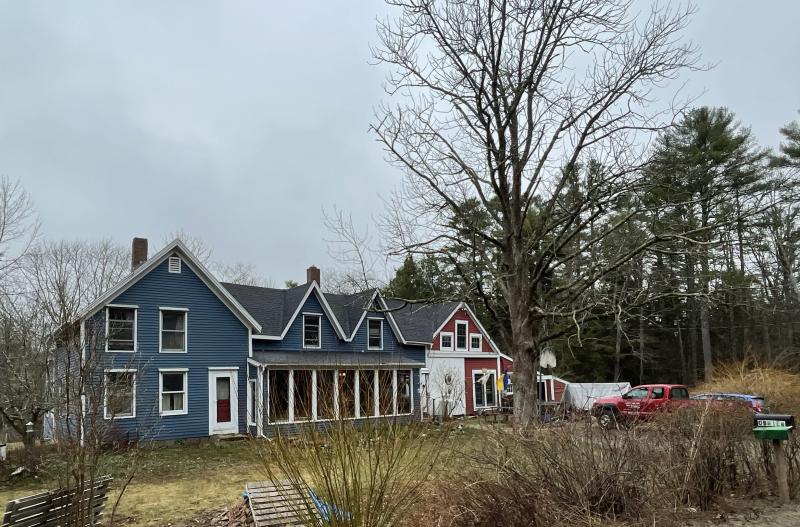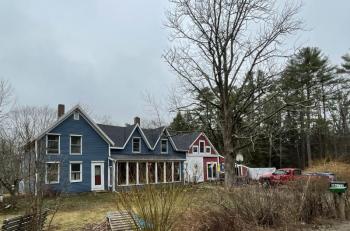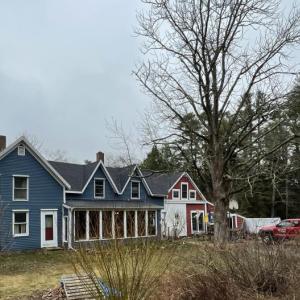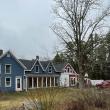This Week in Lincolnville: So Many Layers
Diane O’Brien, This Week in Lincolnville writer emeritus, once again offered to produce a piece for this week’s column. She writes:
A house often holds complicated stories within its walls. Then the occupant(s) die or move away, the house changes hands and a new tale begins.
I wrote the prologue to my book, Staying Put in Lincolnville, Maine, nearly thirty years ago, and called it “Walking on Layers”. Like much in that book I was picturing what life was like before my time. Based on what the dozens of older people had told me as I went about town interviewing anyone who’d talk to me, I began to see our 200-year-old town as a series of layers.
But now, I realize I’m walking on layers of my own. This spring’s many snowfalls got me remembering one in late March 1970 when we, a not-yet-married couple, 25 and 29 years old respectively, drove up through a snowy and magical Sleepy Hollow to look at a house that was for sale. Our wedding was in April; we closed on the house in July.
Fifty-three years-worth of layers are now piled on top of what was already a hundred-year-old house in 1970. Wally and I added three births, two deaths, five milk cows, about a dozen dogs, uncounted cats, incalculable hugs and many quarrels. Barbecues and Christmas mornings, school snow days and surprise visits. Sickness and health. All of it.
So many layers.
The intensity of family life or the very personal intentionality of a solitary one permeate our homes. Because we live in such a small place (still only 2,315 of us) we do know each other. Even newcomers quickly know the houses, recognize the faces, notice the details. And as time goes by, we see the changes.
The bright patchwork of early spring flowers that Ross Overcash planted so long ago is in full bloom at the end of what used to be his driveway next to Viking Lumber.
Ruth Nickerson Felton’s farm (and I still see her father’s dahlias growing next to a long-gone garage) is today her granddaughter’s. Ruth’s family tends the same garden Ruth worked in, and where Joe Nickerson before her planted his.
I always look for Peg Miller’s red geraniums, the wild tangle she kept winters in her bay window at the farmhouse overlooking Pitcher Pond, though today Peg lives at Tall Pines and the window is empty.
Certain figures, gone now, linger in my mind’s eye: Jenny Dearborn, short and plump, tending her dooryard flowers. Our family called her “jennyanydots” or the Gumbie Cat. Maybe my sons remember why. Her house was abandoned years ago for a trailer and another family. The dooryard is filled with life: hens scratching in the weeds, eggs and plants for sale, Christmas lights in season. And any day now the bulbs Jenny planted will start blooming.
So here’s what I wrote so many years ago to introduce Staying Put:
Every place I walk in this town of Lincolnville, Maine I’m conscious of the ones who walked here before me. Imagine layers beneath our feet, each one a different era, but peopled with individuals whose lives were every bit as filled with the STUFF OF LIFE as our own. On Pond Bridge at the Norton Pond inlet, now a bland state highway culvert, lovers kissed in the moonlight. In the kitchen of a certain house near Youngtown Road a mother rocked her dying child until its breath stopped. Living rooms saw paper-flower- bedecked weddings as well as funerals, sometimes for an aged parent whose life had ended with a satisfyingly peaceful death, but just as often for a younger person—mother, beloved child or sturdy breadwinner—knocked down suddenly by accident or disease leaving their numbed relatives to carry on.
Bedrooms saw birth under every possible condition, rooms that can be stifling in summer with their low eaves and only one window to let a little breeze in. And in winter they were frigid; how did the laboring woman stand it? Babies were delivered by husbands, grandmothers, sisters, aunts or perhaps the neighbor woman everyone called the midwife. Husbands made long, desperate rides through snow or mud or rain, usually at night it seems, to get the doctor. If he didn’t get back in time his wife delivered alone. Sometimes the baby died, and too often, the mother did. But mostly both thrived.
Do you live in a brand-new house? No layers there, you say. But think again; you live on top of somebody’s hayfield, potato patch or woodlot. Think how haying season could stress already-beleaguered marriages. Thunderclouds piling up when the hay was almost dry, but still in the field, every family member working to the limit of their strength to pitch the hay onto the wagon and load it into the loft of the barn. The man worried about feeding his stock, caring for his family, while the woman worried about getting the next meal on the table. Woodlots saw tragedy—a hung-up tree or limb is called a widow-maker for good reason. But sometimes a newly-married couple, before babies kept the wife home, ventured down to a camp in the woods behind Slab City, say, for the winter; she cooked while he ran a crew cutting wood. Maybe he worked for a wealthy summer family, and they both stayed nearby in a seaside cottage, brief interludes before real life put an end to such intimacy.
Our gardens yield bucket after bucketful of broken crockery, metal buckles, nails, latches, hinges, even rotting leather shoes. Did a child drop the sugar bowl one morning? Did he get whipped for it? Or did the husband, angry at his inability to get a few dollars ahead, smash his wife’s favorite vase, or did she, worn out with too many kids, throw the plate at him? Or did things simply get broken, worn out and thrown away, just like ours do today?
Anywhere in town you might pick up a horseshoe, the only tangible sign of the legions of animals that made life here possible. The horse was revered then as a man loves his pick-up today, his snowmobile, his racy little car; all that’s left of them is some mildewy harness hanging in old barns and the thousands of iron shoes they wore. How many hundreds and hundreds of docile cows grazed on our rough pastures, chewed their cud under this or that very oak and fairly trotted to the barn to be milked at dusk? What about the hundreds of thousands of chickens, hens and broilers, spending their brief lives in the now-ruined henhouses crumbling around town?
But did anything important happen here? In Lincolnville’s 230 years since “settlement”, (that obscure day in 1770 when the first white settlers, Nathan and Lucinda Knight, built their log cabin and stayed), has anything of historical note happened here? Truthfully, very little. But looked at another way, every human thing did.
We no longer raise all our food, make our clothes and marry someone just down the road. The animals in our lives are pampered pets, not the means to survival. Yet we are raising children, loving (and hating) one another in turn, striving to get ahead while, at the same time, trying to do the right thing.”
Town Business
The School Committee, Select Board, and Budget Committee have reviewed the municipal and school budgets, and made their recommendations. Next step is to vote in the town election on June 13, and to attend Town Meeting on Thursday, June 15 at 6 p.m. at Lincolnville Central School to make your votes heard.
Nomination papers to get on the ballot have been turned in, but should you still want to serve your town, after election you can contact the Town Office about getting appointed to a board that may still need members. I always suggest the Budget Committee, a board I have served on for many years, after being written in long ago, and often has unfolded seats. This is relatively light lifting- generally having a half dozen meetings or so between February and April, and you are able to see where all our tax dollars go- how the sausage is made, so to speak
Condolences
Sympathy to the family of Melissa Lamont McGaw, a woman with strong Lincolnville roots.
And to the family of Jerry Bernier, my neighbor, and a good friend of my late father.
Enjoy the week, Lincolnville, and my thoughts are with all the parents with children on Spring Break, particular to those who still work from home. I, for one, am looking forward to my office on Camden Harbor, and I suspect my wife may elect to work in the office this week, as well. And to the children: Get outside and play, the screens aren’t going anywhere, and there is so much to explore....




























